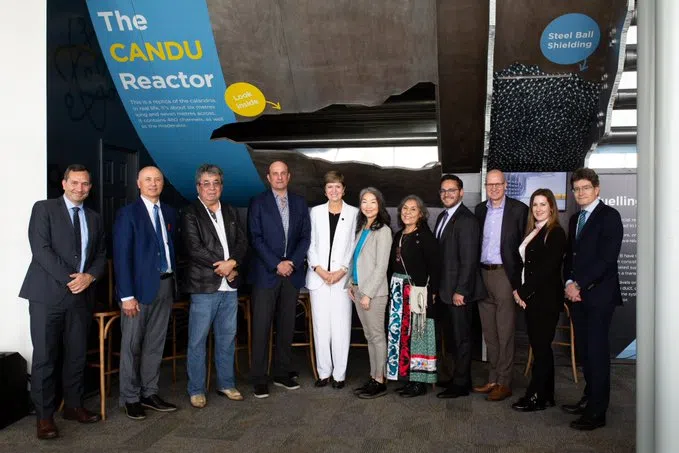Local work to advance the medical isotope industry is getting a boost.
The federal government has pledged $35 million in support of Canadian advancement of the use of isotopes.
Medical isotopes are used to fight cancer and are used in diagnostic imaging. Outside of power generation, Bruce Power produces the isotope cobalt-60, which sterilizes 40 per cent of the planet’s single-use medical devices. Medical grade cobalt-60 is used in radiation therapy to treat cancers.
Bruce Power also produces lutetium-177, which is a medical isotope used for therapy of cancers, including prostate cancer and neuroendocrine tumours.
On Tuesday, Parliamentary Secretary to the Minister of Public Safety and Member of Parliament for Oakville North-Burlington, Pam Damoff, announced the official launch of the new pan-Canadian consortium called the Canadian Medical Isotope Ecosystem (CMIE).
It will support projects with Bruce Power, BWXT Medical, McMaster University and Canadian Nuclear Laboratories.
The government expects the Canadian Medical Isotope Ecosystem to attract over $75 million in investments, create or maintain over 600 highly skilled jobs for Canadians, and create 30 internship opportunities.
This funding comes after the Canadian Nuclear Isotope Council’s report, Isotopes for Hope: Canadian Leadership Needed Now More Than Ever, which called on the federal government to invest in the growth of Canada’s medical isotope industry.
As part of the funding announced Tuesday at Bruce Power, the Saugeen Ojibway Nation will take the next step in their partnership with Bruce Power to jointly produce, advance and market new isotopes.
Meanwhile last week, a local isotope coalition was launched at an event in Port Elgin. It’s called the Southwestern Ontario Isotope Coalition and is made up of the City of Owen Sound, the Canadian Nuclear Isotope Council and the Nuclear Innovation Institute.
It will aim to develop a common approach to marketing southwestern Ontario as a major centre of global isotope production and raise awareness provincially, nationally, and among local communities of the role the region plays in isotope production.
It will also aim to attract public and private investment to expand the region’s role in the isotope industry.
Owen Sound Mayor Ian Boddy says in a statement, “This coalition will allow us to work with local communities, public and private sector organizations, and governments across Canada to highlight and develop our role in this national imperative.”
James Scongack, who is chair of the CNIC is a co-chair for the new coalition. He says in a statement, “It’s going to take partnerships across Canada working together to deliver on the ambitious vision outlined in the CNIC’s recent Isotopes for Hope report, and this is an important step forward to ensure Southwestern Ontario can make an important and growing contribution as a region.”
The Government of Canada announced $35M in funding to enable the Canadian Medical Isotope Ecosystem, a pan-Canadian consortium that will advance and accelerate the development of the next generation of novel medical isotopes and technologies.
Read more: https://t.co/k4ijMna6FN pic.twitter.com/zta0OOySuq
— Bruce Power NGS (@Bruce_Power) June 27, 2023
Harnessing regional strengths to boost medical isotope production and development!@CityOwenSound | @IsotopesCanada https://t.co/FlwCHyLSdO
— @NII (@OntarioNII) June 26, 2023






